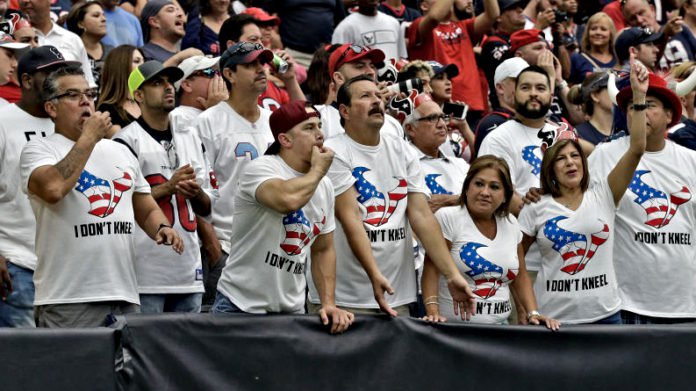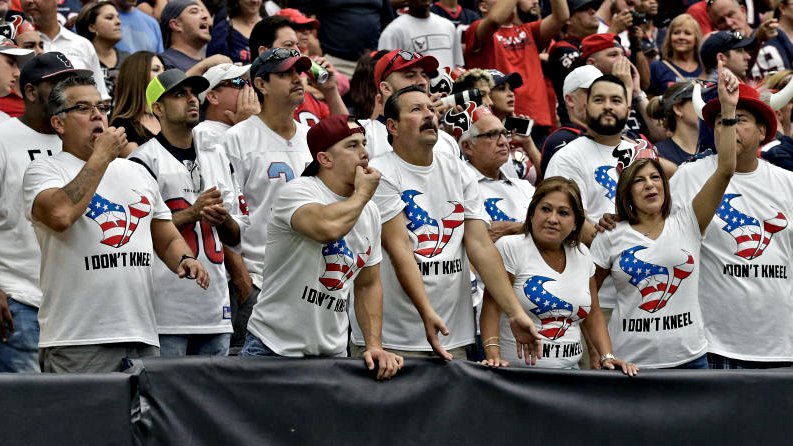[ad_1]

The NFL has made an historic error. Its players are so moved by the crisis of police violence that for years they’ve been lodging silent protests before games and how does the league respond…erect rules that try to silence them.
Not the smartest move to make during the same week that video emerged of police mistreating NBA player, Sterling Brown of the Milwaukee Bucks, but the NFL decided anyway to tell players to take their protests into the locker room where no one has to see them. The NFL has made a moral error in seeking to quiet players who are protesting the violent death of their brothers and sisters at the hands of government actors in a nation where public dissent is a cherished part of our DNA. It has also made a tactical error.
The very essence of a protest is to be disruptive. It should make its audience uncomfortable. It’s more effective when it occurs in spaces where it’s unwanted. It should underline the selflessness of the protester—they’re not doing this for personal gain, they’re speaking up for others who cannot speak for themselves. It should force unwilling people to pay attention and, if possible, it should stop the flow of capitalism.
When Black students boycotted segregation in 1960 by sitting at Southern lunch counters it disrupted the social order and slowed down business. When Tommy Smith and John Carlos stood on the podium at the 1968 Olympics giving the Black Power salute, it was an unwanted gesture that forced people to pay attention.
When Black Lives Matter shuts down a highway it disrupts the flow of capitalism and shakes people awake from their daily routine. The NFL’s kneeling players have fit into this pantheon by as they demand awareness of police violence by disrupting the social order while also exuding selflessness, making it a discomforting experience for many white fans. Now that the NFL has banned kneeling it has essentially given the gesture new life and new power. The institution has decided that it officially disapproves, and any kneeling player faces penalties and risks losing his career—but who wants a protest that’s supported by the power structure? This simple gesture now means so much more. Anyone who’s willing to do it has got to be willing to risk it all by speaking his mind. With the NFL’s decision, players willing to kneel have been given an amazing opportunity to disrupt.
My hope is that these players will see the NFL’s move as an attack on their legal rights as citizens and their moral rights as humans. I would love to see a mass response—like, most of the NFL on the field in week one, kneeling during the anthem, forcing the NFL to be the bad guy and punish hordes of players from all different backgrounds all at once. But, then again, maybe not. I don’t want to get wrapped up in that infinity war.
Remember, all of this was supposed to be about raising awareness about police violence and we’ve totally gotten away from that. It’s not the players fault—they’ve silently kneeled week after week—but President Donald Trump, many white fans and the political right have transformed this into a culture war that’s about almost anything but police violence.
READ MORE: The NFL’s latest policy on player protests fumbled its chance to stand on the right side of history
Now the NFL has forced us all into a battle over whether players have the right to protest and the players and NFLPA President DeMaurice Smith will have to wage that war. They can’t allow the NFL to muzzle them. We have to know how far the NFL is willing to go and whether or not the players can ever find a way to protest racial injustice that’s respectful and docile enough for the NFL and white America.
I’ve been in favor of this movement since Colin Kaepernick started sitting on the bench during the anthem in 2016. I love seeing players use their national platform to raise awareness. I’d put Kaepernick alongside Muhammad Ali and Arthur Ashe as Black professional athletes who effectively leveraged their fame to change the political consciousness. Years of kneeling have communicated the same message to many, but we’ve also seen the symbolism behind kneeling be co-opted.
The President and the right have misconstrued the national conversation about the significance of kneeling that it seems harder and harder to get the message out through this method. If you kneel now are you kneeling about police violence or are you kneeling about your right to kneel? It feels like this has been turned into more of a workplace civil war than a conversation about police violence. The NFL kneeling saga has become a battle about itself.
READ MORE: Despite activism, NFL issues policy on kneeling during national anthem
I want the players to fight for their right to speak out, but I also want them to put their spotlight back on police violence. When players kneel during the anthem it shows they have a Black political consciousness that they’re willing to share in a dignified way. I have maximum respect for those who have kneeled, but it may be time for players to find a new way to express themselves on this issue in order to put the focus back on police violence.
Players can go into the community, with media trailing, and sit and talk with parents whose kids were murdered by police. They can join marches. They can mention names of people killed by police in their interviews. The movement could grow in many directions. They shouldn’t cling to the gesture of kneeling—no particular method of protest is bigger than the message. Protest can and should take on many forms that may change over time. For a protest to be truly disruptive, it has got to shock the system, but any gesture repeated enough will lose its ability to shock. I’m not suggesting the players give in to the owners, I’m suggesting they push the conversation away from the hullabaloo of whether or not they can kneel and push it back to police violence.
The fog around kneeling has ultimately become so dense and fraught that it’s hard for kneeling to communicate in the way it once did. Protest must be disruptive, but if kneeling is disruptive to the protest, then they should find a new way to get that all important message across to the masses.
Touré is an award-winning, veteran journalist, cultural critic, and television personality. He is the host of the podcast, Touré Show where he has interviewed Kendrick Lamar, Zadie Smith, Spike Lee, Maxwell, and is working on a book with Rakim.
[ad_2]
Source link

